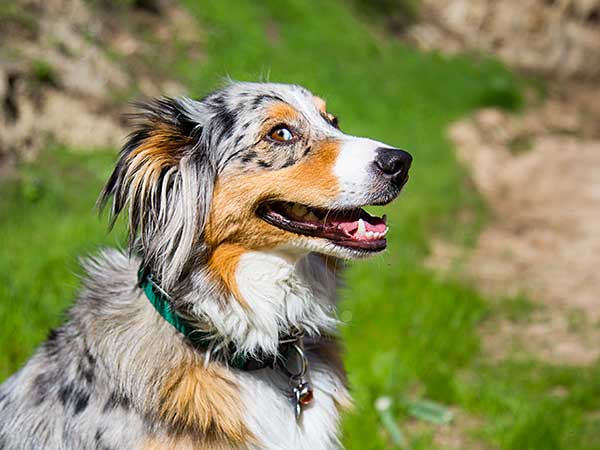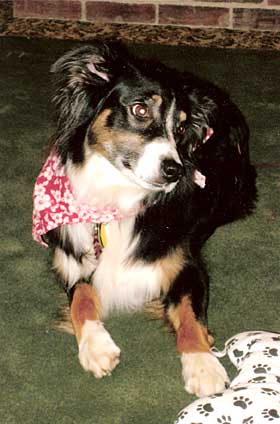
Thinking Of Trying Therapy Dog Training With Your Australian Shepherd?
Your Australian Shepherd brings a smile to your face at least once a day. Have you ever thought about sharing that special ability with others? That is exactly what encouraged me to become involved in pet therapy some 15 years ago.
My usually over-exuberant, Frisbee crazy Aussie, Tini, would suddenly become a very different dog when anyone was in need of a cold nose and a warm tongue to cheer them up. She would lay her head on a lap and patiently look up with her soft, amber eyes. Who could resist such a thing? She knew instinctively what she should to do to make humans happy, so at 9 years of age Tini became a certified therapy dog.
This was only the beginning for us. Since then 5 more of my dogs have become working therapy dogs. Currently, 9 year Sera and her daughter, 4 year Molly, are my main traveling companions for pet therapy work. But 9 month old Bryn has recently passed her Canine Good Citizenship test, a step on our path to her therapy dog certification.

Joseph Hotter / stock.adobe.com
Does your Aussie have what it takes to be a certified therapy dog?
Every Aussie needs a job. A job as a visiting dog can create positive opportunities for you, those you visit, and your dog. Your Aussie gains quality time with you through training and while you are visiting others. During visits, the dog is the focus of attention. What Aussie doesn't like that? While these rewards are apparent, the impact of therapy dogs goes much deeper. Public opinion of dogs as our partners increases as opposed to the scary dog stories we frequently hear on the evening news.

Start with our official ebook Guide To Australian Shepherd Training & Care. It was created by Aussie lovers for Aussie lovers. You can read this practical guide on any computer, tablet, or smartphone.
A therapy dog is the model of a well trained companion. I long ago lost count of how many people have said, "I wish my dog would behave like that." It always gives me the opportunity to stress the importance of training and socialization for all dogs. A positive reinforcement beginning obedience class is a good place to start. However, you also need to build your Aussie's confidence and trust in you as a handler. She needs to be exposed to a variety of environments and situations as well as feel comfortable with unfamiliar sights and sounds. Many long term care facilities welcome visits from well-trained dogs as long as they have a health certificate from a veterinarian. Visit a family member who might be in a nursing home. They would love to see you and your dog. I usually start my pups on short visits when they are 8 weeks old. You notice, I said short visits. This should be a fun, rewarding experience with lots of praise, petting and treats.
Joining a therapy dog group can provide valuable information and support for those new to pet therapy. Many groups provide training to pass the AKC's Canine Good Citizen test and therapy dog testing. Testing and registration with a therapy dog organization is important for you, your dog and the people you visit. Groups such as Therapy Dogs International and Delta Society's Pet Partners will test, register and provide insurance for visiting teams. Most testing is based on an extension of the Canine Good Citizen test.
After You Have Successfully Comleted Therapy Dog Training
Once you have passed your test and received documentation of insurance and your dog's identification tag, you are ready to visit. You may choose to visit on your own or join a volunteer organization in your area. Both have advantages and disadvantages. Working on your own accommodates your own personal schedule. If you decide to work on your own, however, you should establish guidelines in advance with the facility. For example, insist that a staff member accompany you on your visits for you and your dog's protection. On the other hand, working with a group may provide many learning opportunities which can be invaluable to a new therapy dog team.

Gayle Silberhorn
Sera has undertaken therapy dog training and now raises spirits wherever she goes! Training therapy dogs takes dedication but it is well worth the effort for everyone concerned.
There are endless possibilities for places for you and your dog to visit. Hospitals, nursing homes, assisted-living facilities, schools, children's centers and libraries welcome well behaved dogs. Personally, we have also visited adult day care, participated in the Alzheimer's Memory Walk and as helpers in physical therapy. We also take part in dog safety programs in schools. Our favorite activity is to entertain with tricks, agility, obedience and Frisbee demonstrations.
Our latest project is to provide visits to hospice patients either at nursing facilities or private homes. As part of the hospice team, we are provided with continuing education and support. Sera and I recently took part in a communications seminar where I had the opportunity to explain Sera's part in communicating with hospice patients. Dogs can truly communicate what we as humans cannot: unconditional love.
Of all the dog activities in which we have participated—obedience, agility, rally, and canine disc—therapy work is by far the most rewarding. Trophies and ribbons are nice to look at, but the smile your dog brings to others is priceless. However, make certain that your choice of activity for your dog is the best choice for both of you. Not every dog or human, for that matter, is cut out for therapy work. But if you decide that therapy work is for you and your best friend, I guarantee you will never regret it.
Gayle Silberhorn,
Sera TDIAOV, Molly TDI, and Bryn therapy-dog-in-training
Big Run Australian Shepherds
Have Dog Training Questions?
Check out these introductory dog training videos...
I want my dog to stop being aggressive.
I want some help training my new puppy.
I want my dog to stop barking at everything.
Get Australian Shepherd Info, Website Updates, Special Offers, and Cartoons...
FREE GIFT
You'll also receive a free copy of the ebook
My Everyday Dog Training Tools
by professional dog trainer Daniel Abdelnoor, "Doggy Dan"











 Loading Image...
Loading Image...